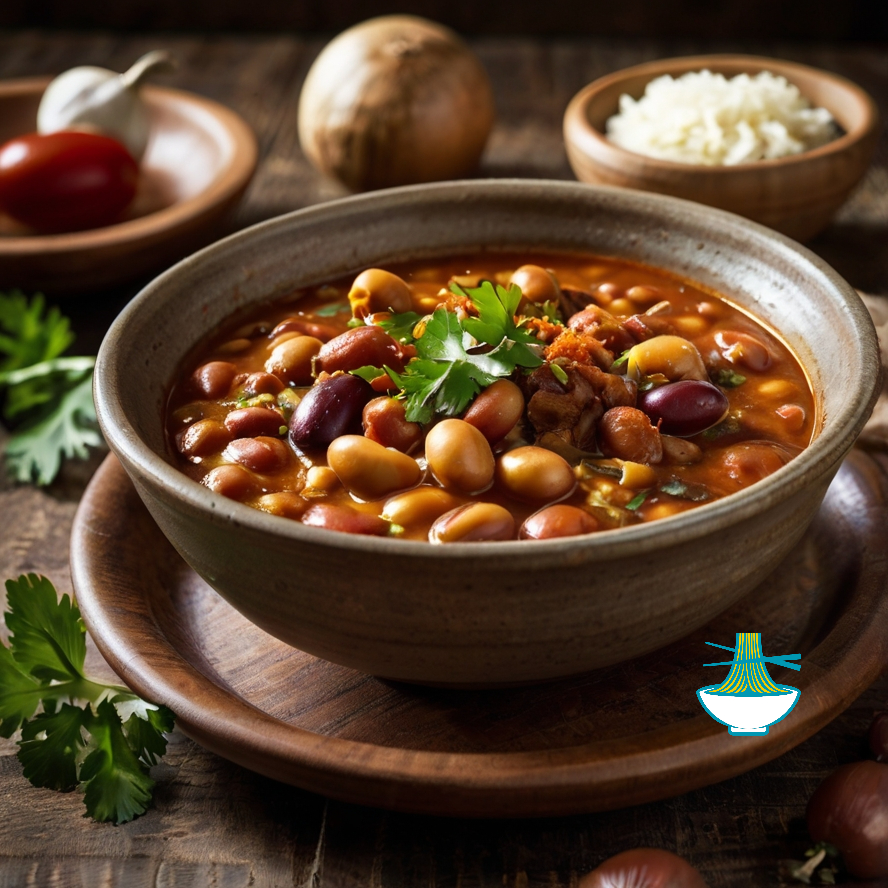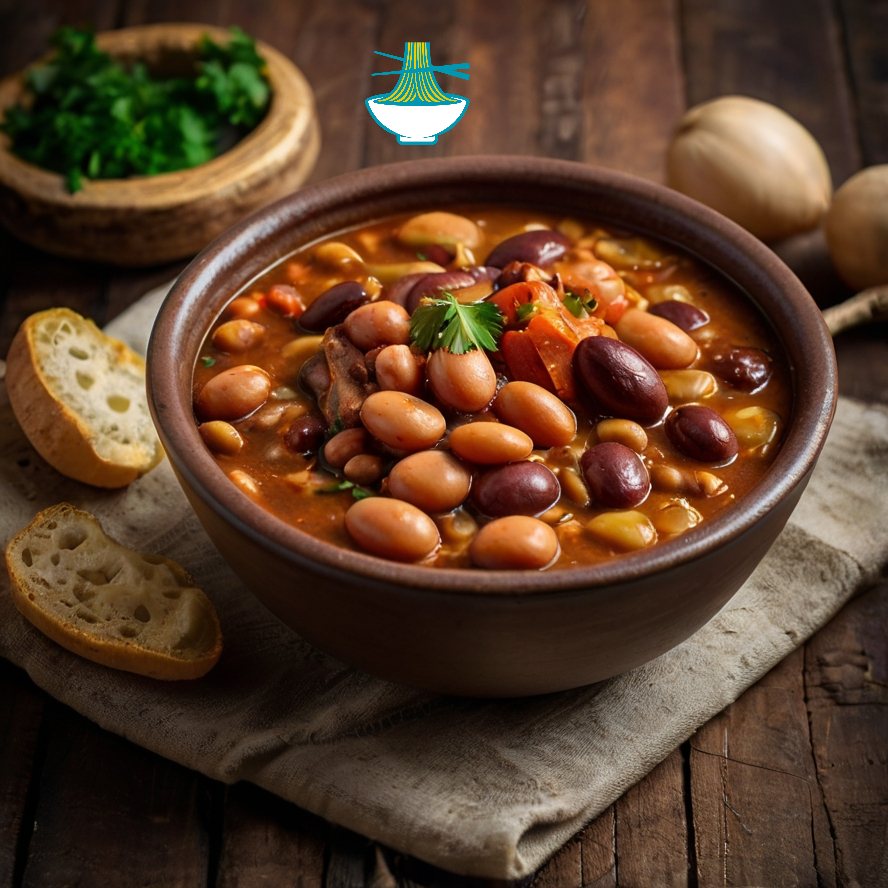Pupos is a traditional Lithuanianbean stew known for its comforting and nourishing qualities. Rich in fiber, protein, and essential minerals, beans in Pupos support digestive health, heart function, and energy levels. The dish can also include meat, adding extra protein and flavor. While Pupos is filling and nutritious, it's important to consume it in moderation, as it can become calorie-dense, especially when paired with fatty meats. Ideal for colder months, this hearty stew provides both warmth and a balanced blend of flavors, making it a satisfying choice for anyone seeking a wholesome, traditional meal.
Ingredients:
- 1 cup mixed beans (kidney beans, white beans, black beans)
- 1 medium onion, chopped
- 2 cloves garlic, minced
- 1 carrot, sliced
- 1 potato, peeled and cubed
- 1/2 lb (225g) pork or smoked sausage (optional)
- 4 cups vegetable broth or water
- 2 tablespoons vegetable oil
- 1 teaspoon dried thyme
- Salt and pepper to taste
- 1 tablespoon fresh dill (optional)
Instructions:
- Rinse the beans and soak them overnight or use canned beans to save time.
- In a large pot, heat the vegetable oil over medium heat. Add the chopped onion and minced garlic, sautéing until soft.
- If using meat, add the pork or sausage to the pot and brown it for 5-7 minutes.
- Add the carrots, potatoes, and soaked beans to the pot, stirring to combine.
- Pour in the vegetable broth (or water) and bring the stew to a boil. Reduce heat and let it simmer for 45-60 minutes, or until the beans are tender.
- Season the stew with dried thyme, salt, and pepper. Continue to cook for an additional 10-15 minutes.
- Garnish with fresh dill before serving, if desired.
Cooking Tips:
- Quick Preparation Tips:
- To speed up the cooking process, you can use canned beans instead of dried beans. While dried beans require soaking overnight and cooking for a longer time, canned beans can be simply rinsed and added directly to the pot. This saves significant cooking time and is especially helpful for busy weeknights.
- Healthier Modifications:
- To make the dish healthier, you can reduce the amount of oil used or substitute it with olive oil, which is lower in saturated fat and provides heart-healthy monounsaturated fats.
- You can also opt for leaner meats, such as turkey sausage or chicken, instead of pork or smoked sausage to reduce the fat content.
- For a more plant-based version, you can exclude the meat entirely and rely on the beans and vegetables for protein and flavor.
Serving Suggestions:
- Side Dishes:
- Pupos pairs well with crusty rye bread, a staple in Lithuanian cuisine, which helps balance the richness of the stew. You can also serve it with a side of fresh salad, perhaps with beets or cabbage, to add a tangy contrast to the hearty stew.
- Dietary Modifications:
- Gluten-Free: The dish can easily be made gluten-free by ensuring that the vegetable broth and other ingredients do not contain gluten. Additionally, using gluten-free bread as a side can complement the stew.
- Vegan/Vegetarian: By replacing the meat with extra vegetables or plant-based protein sources (like tofu or tempeh), and using vegetable broth, Pupos becomes a suitable option for vegans and vegetarians.
Note:
Cultural and Historical Insights about Pupos:
- Pupos is a traditional Lithuanian bean stew that has deep roots in the country’s culinary culture, particularly during the colder months. This dish is often prepared in Lithuanian households as a comfort food that provides warmth and nourishment. Historically, it was a staple in rural households, especially in times when resources were limited, as beans were easily accessible and packed with nutrients.
- In Lithuania, Pupos is frequently made for festive occasions such as Christmas or New Year’s Eve. It is often served during family gatherings and community events. In some parts of the country, the stew is made without meat, while in others, pork or smoked sausage is added to enrich the flavor and increase the dish’s heartiness.
Regional Variations:
- There are subtle regional differences in the preparation of Pupos. In some regions, it might include additional vegetables such as parsnips or leeks, while others stick to a simpler version with just potatoes, carrots, and beans. In certain areas, smoked meat is an essential part of the stew, while other regions prefer a vegetarian version, showcasing the flexibility of the dish.
Alternative Recipes and Comparisons with Other Dishes:
- Pupos is similar to other bean-based stews from around the world. In the Middle East, dishes like lentil stew (عدس) are often made with a variety of beans and spices, offering a hearty and nutritious meal. In Western countries, particularly in the United States, bean soups or stews are also popular, with regional variations such as pinto bean soup or minestrone—both sharing similarities in their use of beans and vegetables.
Frequently Asked Questions:
Can I use other types of beans?
- Yes, you can use different types of beans depending on availability or personal preference. White beans, black beans, and kidney beans all work well in this dish. If you prefer a different texture, you can experiment with lima beans, chickpeas, or even mixed beans for variety.
Can this dish be made vegan?
- Absolutely! You can easily make this dish vegan by using vegetable broth instead of meat-based broth and omitting the pork or sausage. You can also add more vegetables or plant-based proteins like tofu to make the dish even more filling.
What’s the best way to store this stew?
- This stew can be stored in the refrigerator for up to 3 days. To keep it longer, you can freeze it for up to 3 months. When reheating, add a little extra water or broth if needed to maintain the desired consistency.
Can the stew be made lower in fat?
- Yes, you can make Pupos lower in fat by reducing the amount of oil used and opting for leaner meats, such as turkey sausage or chicken breast, instead of pork or smoked sausage. Using less oil or substituting with a healthier fat, like olive oil, can also help.

Nutritional values and benefits
1 Cup Mixed Beans (170g)
- Calories: 240
- Carbohydrates: 40g
- Protein: 16g
- Fat: 1g
- Sodium: 10mg
- Vitamins: Folate: 150mcg (38% DV)
- Minerals: Iron: 4mg (22% DV), Magnesium: 80mg (20% DV)
Nutritional Benefit: Beans are an excellent source of plant-based protein, fiber, and iron. They promote digestive health, lower cholesterol, and support muscle repair and energy levels.
1 Medium Onion (110g)
- Calories: 44
- Carbohydrates: 10g
- Protein: 1g
- Fat: 0g
- Sodium: 4mg
Nutritional Benefit: Onions are rich in antioxidants and sulfur compounds, which support immune health and may have anti-inflammatory properties.
2 Cloves Garlic (6g)
- Calories: 9
- Carbohydrates: 2g
- Protein: 0.4g
- Fat: 0g
- Sodium: 1mg
- Vitamins: Vitamin C: 1.5mg (2% DV)
Nutritional Benefit: Garlic has antimicrobial and immune-boosting properties and is known for supporting heart health and reducing inflammation.
1 Carrot (61g)
- Calories: 25
- Carbohydrates: 6g
- Protein: 1g
- Fat: 0g
- Sodium: 42mg
- Vitamins: Vitamin A: 10,000 IU (200% DV), Vitamin C: 4mg (7% DV)
Nutritional Benefit: Carrots are high in beta-carotene, which supports vision health, and vitamin A, which promotes immune function and skin health.
1 Potato (150g)
- Calories: 110
- Carbohydrates: 26g
- Protein: 3g
- Fat: 0g
- Sodium: 10mg
- Vitamins: Vitamin C: 20mg (33% DV), Potassium: 620mg (18% DV)
Nutritional Benefit: Potatoes provide a great source of carbohydrates and potassium, which support energy production and heart health.
1/2 lb Pork or Smoked Sausage (225g) (Optional)
- Calories: 450 (approximate for pork)
- Carbohydrates: 0g
- Protein: 25g
- Fat: 40g
- Sodium: 800mg
Nutritional Benefit: Pork adds a source of protein and healthy fats but can be high in sodium and saturated fats, so it's recommended to use in moderation.
4 Cups Vegetable Broth (960ml)
- Calories: 40
- Carbohydrates: 8g
- Protein: 2g
- Fat: 0g
- Sodium: 800mg
Nutritional Benefit: Vegetable broth enhances the flavor of the stew while providing low-calorie hydration and some electrolytes.
2 Tablespoons Vegetable Oil (30g)
- Calories: 240
- Carbohydrates: 0g
- Protein: 0g
- Fat: 28g
- Sodium: 0mg
Nutritional Benefit: Vegetable oil provides healthy fats, which are essential for cell function and energy production.
1 Teaspoon Dried Thyme (1g)
- Calories: 3
- Carbohydrates: 1g
- Protein: 0.1g
- Fat: 0g
- Sodium: 0mg
Nutritional Benefit: Thyme has anti-inflammatory properties and is rich in vitamins A and C, supporting immune health.
1 Tablespoon Fresh Dill (optional)
- Calories: 1
- Carbohydrates: 0.2g
- Protein: 0g
- Fat: 0g
- Sodium: 1mg
Nutritional Benefit: Dill is rich in antioxidants and essential oils, which help with digestion and promote overall wellness.
Summary of Nutritional Benefits:
Pupos provides a hearty, fiber-rich meal packed with plant-based protein from beans and vitamins from vegetables like carrots and potatoes. The optional pork or sausage adds extra protein, but it's important to balance it with the lower-fat ingredients. The combination of beans, vegetables, and herbs like thyme offers various health benefits, including improved digestion, heart health, and immune support. Enjoy this filling stew for a satisfying and nutritious meal.


Comments